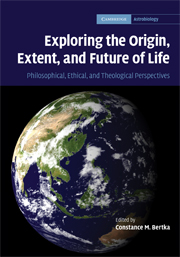 Exploring the Origin, Extent, and Future of Life
Exploring the Origin, Extent, and Future of Life 1 - Astrobiology in a societal context
Published online by Cambridge University Press: 29 December 2010
Summary
Introduction
In 2003 the American Association for the Advancement of Science, Program of Dialogue on Science, Ethics, and Religion, invited over twenty scholars from diverse fields, scientists active in astrobiology, as well as philosophers, historians, ethicists, and theologians, to explore together the philosophical, ethical, and theological implications of research and discoveries in astrobiology. A major motivation for this effort was the recognition that the very questions that define astrobiology as a discipline – Where do we come from? Are we alone? Where are we going? – are multidisciplinary in nature and have broad appeal to the public-at-large.
It is unavoidable that the science of astrobiology will intersect with, and inevitably challenge, many deeply held beliefs. Exploration possibilities, particularly those that may include the discovery of extraterrestrial life, will continue to challenge us to reconsider our views of nature and our connection to the rest of the universe. Much work has already been done in this area. What is unique about our present circumstance is that past theoretical musings may soon benefit from a renewed urgency that is awakened both by new discoveries and by technological advances. Many of the astrobiologists assembled for this workshop have in common another interest, working proactively to provide more opportunities for non-scientists to both share in the excitement of this field, and to be informed participants in a public dialogue that considers the opportunities and challenges associated with astrobiology in the near future.
- Type
- Chapter
- Information
- Exploring the Origin, Extent, and Future of LifePhilosophical, Ethical and Theological Perspectives, pp. 1 - 18Publisher: Cambridge University PressPrint publication year: 2009
References
- 2
- Cited by


